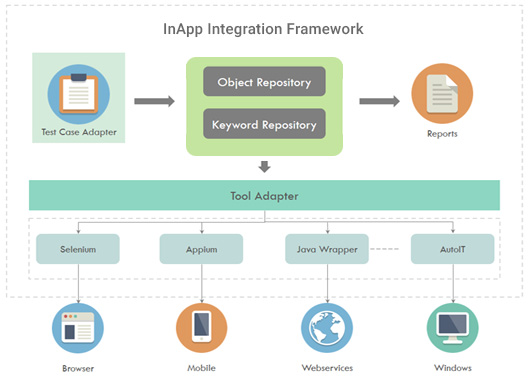Consider a scenario where the client has a SaaS application, which needs to perform seamlessly across browsers, be mobile browser compatible, and have a mobile app extension. If you are required to do manual testing here, you probably would spend ages completing just this project. This scenario is ideal for Test Automation. However, this does not make the work easy as there are several tools for each specific part of the project.
Testing is a noteworthy cost and time factor in custom software development. As many of our clients’ progress from manual to test automation, they do go over a few sorts of bewilderment with the automation tool to be selected for various applications, the extent of test automation required, and different test conditions that are in place.
We have lots of open-source tools available for web or mobile applications. For eg: for web application development, we have selenium, JMeter, cucumber, etc as the open-source tool, and for mobile app development, we have appium, UI Automator, etc. So selecting one and the best from these vast varieties of tools can be a tedious task.
Integrated test automation has been proposed as one answer to diminishing these expenses. An integrated test automation tool guarantees to build the number of tests they run and the recurrence at which they run them. However, the cost factor still persists.
How nice would it have been if we had an open-source tool or framework that can handle all of such cross-browser & parallel testing, cross-platform & device testing, or keyword-driven testing? It would be a huge advantage for all the testers out there to seamlessly support their client for continuous delivery and integration.
This led us to think of a framework that will help to build on the Quality Engineers’ mindset. An open-source test automation tool that can perform innovative services and can cater to end-to-end services – this is what we are offering. We are providing an Open Source Integration Framework that includes a Test Case Adapter, an Object and Keyword Repository, and a Tool Adapter.

Our framework is fit for executing tests, announcing results, and contrasting outcomes and prior trials. Tests completed with this device can be run over and over, whenever we want in a day. We support all of the open-source tools mentioned above used for testing, both web and mobile.
The Test Case Adapter identifies which test case to be executed and specifies which all are the environment. In a large file, it is difficult to execute regression testing for each module separately.
Automation will be based on an Object Repository, where the framework will identify individual pages as a class and various elements of the pages as objects, and a Keyword Repository, where the framework identifies the common keyword used.
The Tool Adapter will identify the test cases for the browser, mobile, and web services separately and execute testing for all of them using the free open-source testing tools available in the market like Selenium, appium, etc. If needed, it can be redirected to web testing from mobile and vice versa.
The output will be a single report which captures the test results coming from both web and mobile apps and is also customizable as per client requirements.
This open-source automation is very much useful for long-term projects as it is very much economical.
